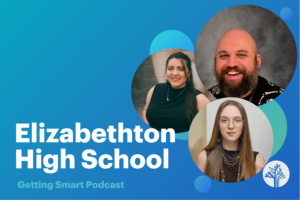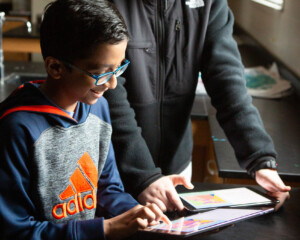NY EdTech Week Highlights Big Apple Startups and Bold Ideas

More than 1000 people gathered last week at NYU’s Washington Square campus to discuss EdTech–entrepreneurs making their pitch, students pondering what to start, and funders looking for the new new thing.
NY EdTech Week felt like ASU-GSV Summit six years ago when we crammed into the SkySong lobby in Phoenix but with a New York sensibility–blue suits and a global context.

NY EdTech Week was hosted by New York University Steinhardt School of Education.
School data pioneer Jonathan Harber directs StartEd, which powers EdTech Accelerator. He launched SchoolNet two decades ago and sold it to Pearson seven years ago and stuck around for a few years serving as CEO of K12 technology. Harber is also teaching a graduate-level seminar at NYU on EdTech.
All star speakers addressed personalized learning, gamification, and the future of HigherEd. Two hour masterclasses taught by NYU faculty covered app design, learner experience design, online learning and global education.
Think tanks topics ranged from early childhood to corporate and adult learning. A Gallery of Innovation (see featured image) showcased 40 seed to growth stage EdTech companies and their CEOs.
Some of the featured startups included:
- ClanEd is a learning platform that combes artificial intelligence, collaborative learning and Finish pedagogy.
- Yellowdig is a social learning platform aimed at improving HigherEd student retention. Early users have seen better engagement and fewer dropouts.
- Kinvolved is catalyzing community to get more kids to school. Used in Meriden, Connecticut and NYC, Kinvolved is led by CEO Miriam Altman, a former NYC history teacher committed to family involvements.
- Rozzy Learning provides career adventures for elementary students. Used by 1000 teachers in 35 states, the female co-founders support Head Start, Boys and Girls Club, and KIPP LA.
- Paragon One coaches students to land competitive jobs and internships. The online membership model combines an automated and live counselors to achieve near 100% job placement.
Highlighting the event were a dozen EdTech startups chosen from about 500 that applied to the NYU Steinhardt Edtech Accelerator powered by StartEd (@startedaccel). The three month program included $20,000 in equity investment and workshops on business and customer development, along with pitching and fundraising tips. Entrepreneurs connect with NYU (@nyusteinhardt) profs and employ students. The dozen companies selected were:
- Cognitive ToyBox: a suite of educational games and apps focused on kindergarten readiness;
- Compliance World: an online community where experts support complying with industry laws and regulations;
- Core Labs: helps organizations build and cultivate professional working networks;
- Invibed: provides financial education that offers lessons, plans and coaching;
- KiraKira3D: online community engaging kids in design, STEM activities and 3D modeling;
- Localized: helps universities provide career and alumni services to students and companies;
- MedAux: messaging system for physicians, nurses and their patients;
- MoxieReader: independent reading tracker for home and schools;
- Quartolio: uses AI to connect and curate insights in published research and journals;
- SecondAccent: assessment and coaching platform for English learners;
- Student Opportunity Center: a platform that helps connect students to real-world learning opportunities and experiences such as conferences, publications and internships; and
- Wonda VR: create interactive content for Samsung Gear VR and Google Cardboard.
Later stage companies presenting included Credly and Chegg, Voxy, and BenchPrep.
Entrepreneurs learned from venture investors including Rethink Education, GSV, Village Capital, New Market Venture Partners, University Venture, and Owl Ventures. A number of private equity and corporate growth investors presented. Sponsoring advisors included East Wind, Evercore, and Cooley.
Blockchain Transcripts
One of the breakout sessions hosted by Impact Chain Lab (@impactchainlab) featured blockchain applications. Blockchain, quoting Don Tapscott, is an “Incorruptible digital ledger of the economic transactions that can be programmed to record not just financial transactions but virtually everything of value.”
Instead of a third party record keeper, blockchain distributes a record of every transaction creating a trust network by consensus and enabling peer to peer value transactions (like sale of cryptocurrency Bitcoin).
Despite current fluctuations (Bitcoin is down 18% this week), cryptocurrency could replace much of the $130 billion in remittance payments made from people working in the US. Western Union charges near 20% to pay in some African countries while crypto entrepreneurs will do it for pennies.
Blockchain can also enable smart contracts– automatic value transfers when agreed upon triggers are met. For example, if your business loses power, the outage could trigger an automatic business interruption payment from your insurance company. Supply chains could become largely automated with machine to machine transactions using blockchain. Musicians and bloggers could get micropayments per download (see Steamit).
The decentralized nature of blockchain will also improve safety and privacy–no more hackable credit reporting agencies holding millions of consumer records.
Democracy Earth Foundation advocates for tamper-proof blockchain voting and smart social contracts.
In education blockchain will facilitate easy transcript sharing–no more calling the college registrar for a PDF of your diploma.
MIT Media Lab issues blockchain transcripts called Blockcerts, a digital certification project with Learning Machine which encourages the use of this tamper proof, recipient owned, and independently verifiable format.
In Greece, University of Nicosia announced that it will move all degrees and credentials to blockchain.
Rather than tuition, coding bootcamp Holberton School charges a percentage of your salary once you find a job. They deliver certificates in blockchain to “simplify the verification process by employers, and help fight against fake certificates and false resumes.” Graduates get a paper certificate and a Digital Certificate Number that can be included on resumes, so that any employer can easily verify the certificate.
BitDegree plans to offer online courses with blockchain-based reward system and achievement tracking (see their white paper).
Blockchain has improved the transcript conversation, but there are many things can be done with today’s tech if we had better interoperability. Related efforts to develop standards for credentials include:
- Credly is a digital credential solution that works with 12,000 organizations.
- OpenBadges, created by Mozilla and managed by IMS Global, allows issuers to provide digital certifications to individuals.
- Credential Engine is piloting a Credential Registry that enables job seekers, students, workers, and employers to search for and compare credentials.
- Mastery Transcript Consortium is a group of independent schools developing a common transcript format (see feature).
We could see more value transfer startups like Teachers Pay Teachers (and students pay teachers) that use blockchain. Edu Dao (@TheEduDAO) is a nonprofit crowdfunding site. Founder Eugene Leventhal (@bbeats1) wants his platform to be public utility that any school can use.
It’s still pregame warmups for blockchain applications in learning but it looks like it will be an integral part of the shift to personalized and competency-based learning.
For more see








0 Comments
Leave a Comment
Your email address will not be published. All fields are required.